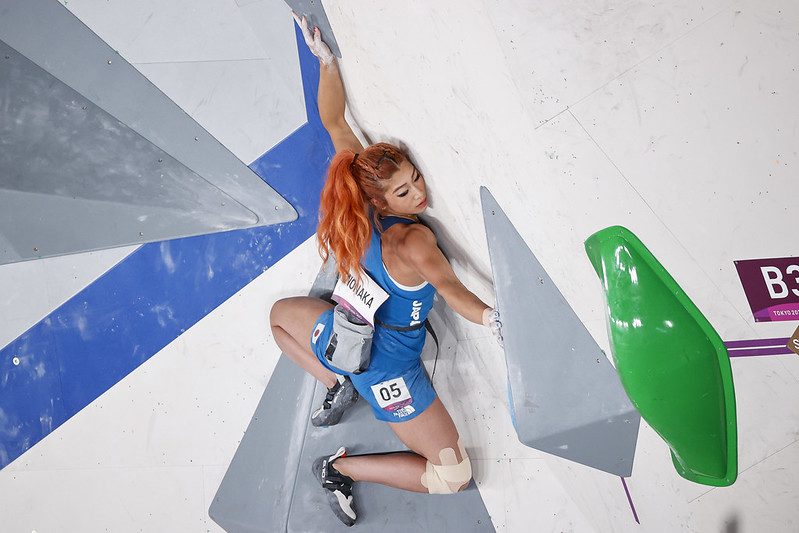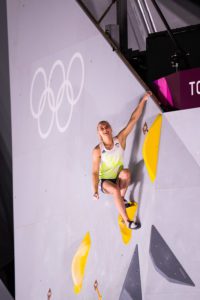The Paris Olympics – A New Scoring System
In November, the IFSC announced a brand new scoring format for the Paris Olympics. It will also feature as a new World Cup event.

The Tokyo 2020 Olympic format presented climbers with a challenge unique from the World Cup Circuit. The high-volume of climbing over the course of two rounds across three disciplines within the context of a multiplication-style scoring format made it difficult for any athlete to ensure their victory.

Although climbing news outlets and meme accounts commented on the Combined Olympic format, it provided an exciting sampler for non-climbing spectators to learn all three disciplines of the sport. Ever since the inclusion of Sport Climbing in the Olympic Games, climbers and the International Federation of Sport Climbing (IFSC) have angled toward three distinct medal events: Lead, Speed, and Boulder.
Preceding the Tokyo Olympics, the decision was made to separate Speed from Lead and Boulder. As Lead and Boulder take problem solving approaches to climbing, it makes sense that these two should group together if having three medal events is impossible. With that said the new Olympic format does provide almost as much confusion as the original Tokyo multiplication-style scoring. It is so detailed that the IFSC bulleted the description of the scoring in their recent press release.
The following is the projected scoring style for the Lead and Boulder disciplines come Paris 2024.
Boulder Scoring
- The maximum score of the Boulder phase is 100
- There will be four boulders in each round, all featuring two zones and one top
- The maximum score of each problem is 25 points – athletes will earn 3 points by securing the first zone, then move to 6 points if they secure the second zone, and claim the full 25 points if they secure the top
- 1 point will be deducted for each fall while attempting to top.

Lead Scoring
- The maximum score of the Lead phase is 100
- There will be one Lead route per round, and only the final 30 moves of each route will award points
- Counting back from the top of the route, the last 15 moves will earn the athlete 5 points each, the previous 10 moves will earn the athlete 2 points each, and the previous five moves will earn the athlete 1 point each
- Any moves prior to the last 30 will earn the athlete 0 points.
Significance
The IFSC said that the scores will add together for a maximum value of 200 points. In their description of the format, the IFSC said that the Paris Olympics will score based on performance. This detail seems odd to include and seems to speak to the nature of the Tokyo 2020 Olympic result.
The fact that Ondra fell from first to sixth simply by falling behind Jakob Schubert, a climber who, despite winning lead, only took home bronze, provides pause for reanalysis. In this way, the Paris 2024 scoring format does assure that the climber who moves highest on the route and boulder problems will win the Games.
It does this by rating two Zones of separation on Boulder problems. This style devalues the Zones and increases the importance of a Top. The significance of flashing a problem is almost lost as attempts provide minor deductions. Although there will be climbers who win based on their number of attempts, it seems that this new format will separate by high point more than precision.

In Lead, the format is ruthless to the bottom of the field. Only after 30 moves, will climbers earn a score. This will certainly separate the field; however, the scoring does beg the question: will the athletes know the number of hand moves in advance of the competition? Given the current structure of these rules, the IFSC suggests a total of 60 hand moves per route: 15 five-point moves, 10 two-point moves, 5 one-point moves, and 30-unscored moves.
While non-climbing spectators will have difficulty following this format, it may help guide the IOC toward allowing three medal events in Los Angeles 2028. The IFSC could argue that this confusing format comes from the constraints imposed by a combined Lead and Boulder Olympic format.
With all of that said, the two-medal event of Paris 2024 Games will go ahead as scheduled. It will see its official debut at the European Championships Munich 2022 on August 11.
What’s more, on December 22, 2021, the IFSC announced the inclusion of a new World Cup event in 2022. It will feature the same Boulder and Lead combined format that will run in Paris and will take place from October 6 to 9, 2022 in Chongqing, China.
Featured Image of Miho Nonaka by Dimitris Tosidis


